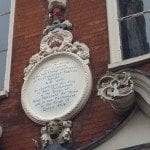Cloud enthusiast, Jan McIntyre, visited Rochester recently and whilst exploring the village her attention was caught by the decoration of a building and plaster plaque announcing “erected at the sole charge and expense of Sir Cloudsley Shovel in 1706”. Curious about the spelling of dear Cloudy’s name, she began looking on the internet and discovered a British heavy rock band called Admiral Sir Cloudesley Shovell, “named after a 17th century English naval commander” – obviously some variety in the spelling of his name!
Since her visit she has done further research and found The Ship and Shovell pub in Craven Passage, Charing Cross and was told by the Rochester Museum that there were a couple of pubs so-named. The pub in Charing Cross, although it is one, is on both sides of the passage and Jan tells us that it is lovely and cosy and inside there is another piece about the gentleman with his name spelt “Clowdisley”. Further, when looking for directions from Camden to Highbury, she noticed there was a Cloudsley Road along with a Street, Place and Square, all named after Cloudsley in Islington.







Sir Cloudesley Shovel died in 1707 (I think), having run three ships, HMS Eagle, HMS Association and HMS Firebrand onto the Isles of Scilly. His body washed ashore and his clothing stripped of anything valuable. He had earlier ignored the pleas of an experienced mariner who was convinced that he was much further north than the Admiral had thought, as events proved. The mariner was hanged for insubordination, having argued with his superior. Sobel’s book incorrectly uses Shovel to illustrate the perils of being unable to measure longitude (east – west distance) when in fact Shovel was too far north.,
I apologise for referring to Rochester as a village. I meant it with affection in my original story and should have corrected it before it went onto the website. Since my interest was caught by the plaque, I have been learning about Cloudesley, including what both Timothy and Alan have written and now I know even more. I enjoy the gradual piecing together and links, like to Sobell’s book. Jan
There are many variations on the spelling of this illustrious gentleman’s name. That was common in past centuries. William Shakespeare, less than a century earlier, is known to have signed his own name with over 50 different spellings. Rochester is rather more than “a village”, as described by Jan McIntyre. It was a City until 1998, when it was downgraded to a Town. Sir Cloudesley was MP for Rochester for several years at the same time as being an Admiral on active service. If you google “cloudesley shovell” you will find over 50,000 references, including two detailed Wikipedia articles about Sir Cloudesley. After an illustrious career, he perished when his ship was wrecked on the Isles of Scilly in 1707. This was one of the nation’s greatest ever naval disasters. When I was at school in the 1950s, we learned English and British history from 1066 to 1832, including such conflicts as the War of the Spanish Succession, the War of Jenkins’ Ear, etc. Sir Cloudesley Shovell featured prominently among the countless facts that we had to learn. Of course the unusual name (Cloudesley was the surname of his maternal grandmother) meant that we remembered him, even though we perhaps did not remember his significance. But, as Alan points out, his death, along with that of thousands of his men, spurred on the quest to improve navigation by finding a method to calculate Longitude.
Admiral Sir Cloudesley Shovell’s history is very interesting and, perhaps erroneously, linked to The Longitude Prize as explained in Dava Sobell’s 1995 book, “Longitude: The True Story of a Lone Genius Who Solved the Greatest Scientific Problem of His Time”